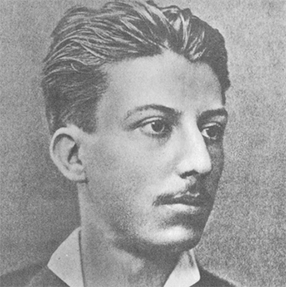The River
translated from the Spanish by Alice Stone Blackwell
With graceful waves, ye waters, frolic free;
Uplift your liquid songs, ye eddies bright,
And you, loquacious bubblings, day and night,
Hold converse with the wind and leaves in glee!
O’er the deep cut, ye jets, gush sportively.
And rend yourselves to foamy tatters white,
And dash on boulders curved and rocks upright,
Golconda’s pearls and diamonds rich to see!
I am your sire, the River. Lo, my hair
Is moonbeams pale: of yon cerulean sky
Mine eyes are mirrors, as I sweep along.
Of molten spray is my forehead fair;
Transparent mosses for my beard have I;
The laughter of the Naiads’ is my song.
El río
Soneto
Triscad, oh linfas, con la grácil onda,
gorgoritas, alzad vuestras canciones.
y vosotros, parleros borbollones,
dialogad con el viento y con la fronda.
Chorro garrulador, sobre la honda
cóncava quiebra, rómpete en jirones
y estrella contra riscos y peñones
tus diamantes y perlas de Golconda.
Soy vuestro padre el río. Mis cabellos
son de la luna pálidos destellos,
cristal mis ojos del cerúleo manto.
Es de musgo mi barba transparente,
ópalos desleídos son mi frente
y risa de las náyades mi canto.
This poem is in the public domain. Published in Poem-a-Day on September 1, 2024, by the Academy of American Poets.
“The River” first appeared as “El río” in Noche rústica de Walpurgis (Imprenta de Ignacio Escalante, 1907). Later, an English translation of the poem by Alice Stone Blackwell was published in Hispanic Anthology: Poems Translated from the Spanish by English and North American Poets, edited by Thomas Walsh (G. P. Putnam’s Sons, 1920). In Mexican Poetry: An Anthology, edited by Octavio Paz and translated by Samuel Beckett (Grove Press, 1985), Paz notes in the foreword that “Manuel José Othón is an inheritor of the academic tradition. There is no attempt at innovation in his work. If he shunned romanticism, he showed little taste for the ‘modernistic’ rhetoric which was carrying all before it at the end of his life. Much of his work is indeed indistinguishable in theme and intention from that of [Joaquín Arcadio] Pagaza, a poet to whom he is related not only by a community of taste but also by a similar aesthetic outlook.”

